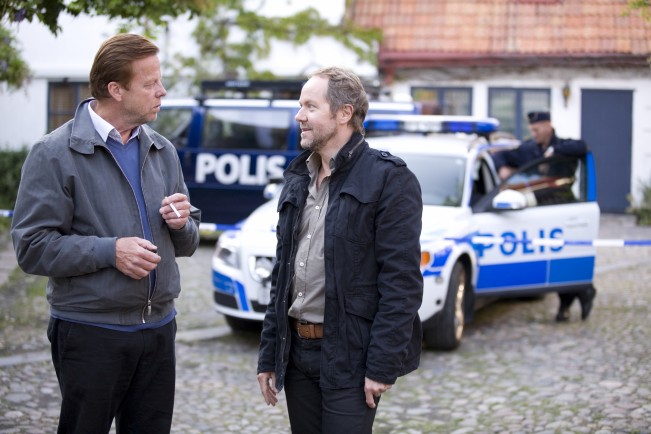

By Gary Dretzka Dretzka@moviecitynews.com
Suddenly, the great Swedish cop Wallander is everywhere …
If one were to judge the crime rate in Sweden strictly by the number of mysteries, you’d think it was a haven for sociopaths, drug runners and gangbangers. Between Henning Mankell, Sieg Larsson, Maj Sjowall and the late Per Wahloo, alone, more fiendish murders have been solved by Swedish novelists than almost anywhere on Earth, outside the United States.
If American TV viewers are familiar with Ystad’s chief inspector, Kurt Wallander, it’s because an English-language adaptation starring Kenneth Branagh has aired on PBS’ “Masterpiece Mystery!,” with new episodes set to return in September. Both Krister Henriksson and Rolf Lassgard have played the melancholic cop, who lives in what ought to be a peaceful port city on the country’s southern tip. If memory serves, Branagh’s interpretation of the character makes him noticeably more brooding and troubled than the one we meet in Henriksson, in the new DVD collection, “Henning Mankell’s Wallander.” His protagonist still is far from being outgoing, but his recent move to a seaside home appears to have lightened his mood somewhat.
 Besides having to sort through 13 episodes’ worth of exceedingly disturbing crimes, Wallander’s required here is to adjust his preconceptions about women in law enforcement. He also must come to grips with his imminent retirement and the responsibility that comes with grooming someone to replace him. On his daily constitutionals with his black Labrador, Jussi, he’s on doctor’s orders to count each step with a pedometer. That doesn’t mean, however, he can’t enjoy a smoke or stiff drink every so often.
Besides having to sort through 13 episodes’ worth of exceedingly disturbing crimes, Wallander’s required here is to adjust his preconceptions about women in law enforcement. He also must come to grips with his imminent retirement and the responsibility that comes with grooming someone to replace him. On his daily constitutionals with his black Labrador, Jussi, he’s on doctor’s orders to count each step with a pedometer. That doesn’t mean, however, he can’t enjoy a smoke or stiff drink every so often.
“Henning Mankell’s Wallander” also reflects a Sweden whose crime rate has grown steadily since the author conceived of the mystery series in 1989. “Faceless Killers” was the first of a baker’s dozen of novels, but Mankell has since added several more stories and teleplays to his resume. Although many westerners have long considered Scandinavia to be something of a crime-free zone, it’s not. As everywhere else in Europe, the steep rise in violent crime has been blamed on an increasing numbers of immigrant workers, easier access to hard drugs, terrorism and vigilantism. Ystad, then, with a population of less than 20,000 people, is northern Europe in microcosm, and Wallander has evolved with the time, if, sometimes, reluctantly.
According to Mankell, “The only way to create a credible character in a novel or movie is to portray a human being who changes, as I do. No living creature is the same tomorrow as they are today (and) we also share the dark sides of life.
“You can see yourself in people that change. But, if they stay the same, although years go by and the stories multiply, it is no longer possible to do so.”
The new compilation from Music Box includes 13 episodes of 90 minutes length each. The acting is uniformly excellent throughout and the police work’s engrossing. This time around, Wallander’s patience and heartstrings often are tested by the presence of a new lead prosecutor, played by Lena Endre (“Faithless”). The scenery is pretty special, too.
As another sign of the times, the first chapter of the series starring Henriksson, “Revenge,” has already been made available a la carte on VOD, via iTunes, Amazon and Vudu. It opens theatrically in Los Angeles and New York on Friday. – Gary Dretzka













